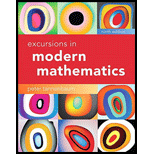
One of the problems with the capture-recapture method is that in some animal populations there are individuals that are trap-happy (easy to trap) and others that are more cagey and hard to trap. Too many trap-happy individuals can skew the data (see Exercise 62 ). A removal method is a method for estimating the N-value of a population that takes into account the existence of trap-happy individuals by trapping them and removing them. In the first “capture,” individuals from the general population are trapped, counted, and removed from the habitat so that they can't be trapped again. In the “recapture,” individuals from the remaining population (those that had not been trapped before) are trapped and counted. The number of individuals trapped in the capture can be denoted by
Want to see the full answer?
Check out a sample textbook solution
Chapter 14 Solutions
Excursions in Modern Mathematics (9th Edition)
- No chatgpt pls will upvote Already got wrong chatgpt answerarrow_forwardFind all values of x for f (x)=(x²-4) 4 where the tangent line is horizontal. 5. Find the slope of the tangent line to the graph of f(x)=-√8x+1 at x=1. Write the equation of the tangent line.arrow_forwardx 1 3 5 7 f -1 3 15 35 7 • Sea) dx from the faible find: 1 f(x) dx by Sempeson method 8 2 if S .dx find h? ? 2Xarrow_forward
- 3. Find the derivative of each function. Label with appropriate derivative notation showing both dependent and independent variables. f(t)=4t(2t⭑+4)³ a. f(t)=4t (2t+4)³ (Answer must be factored.) b. y= 3 1 (2x³-4) 6arrow_forward4.3 The Chain Rule 1. {Algebra review} Let f(x)=2x²-5 x and g(x)=6x+2. Find f[g(−5)]. 2. {Algebra review} Write h(x)=√√8x-3 as the composite of two functions f(x) and g(x). (There may be more than one way to do this.)arrow_forward4.4 Derivatives of Exponential Functions 1. Find derivatives of the functions defined as follows. a. g(t)=-3.4e b. y=e√x c. f(x)=(4x³+2)e³* d. y=- x²arrow_forward
- 4.5 Derivatives of Logarithmic Functions 1. Find the derivative of each function. a) y=ln (-3x) b) f(u)=nu c) 9(x)=x-1 lnxarrow_forward3. If the total revenue received from the sale of x items is given by R(x)=30ln (2x+1), While the total cost to produce x items is C(x)=✗, find the following. a) The marginal revenue b) The profit function P(x) (Hint: P(x)=R(x)-C(x)} c) The marginal profit when x=20 d) Interpret the results of part c).arrow_forward2. The sales of a new personal computer (in thousands) are given by S(t)=100-90€-04: Where t represents time in years. Find and interpret the rate of change of sales at each time. a) After 1 year b) After 5 years c) What is happening to the rate of change of sales as time goes on? d) Does the rate of change of sales ever equal zero?arrow_forward
- 2. Find the equation of the line tangent to the graph of f(x)=ln(x²+5) at the point (-1, In 6). Do not approximate numbers.arrow_forwardonly need help with question 3arrow_forward6. The number of viewers of a television series introduced several years ago is approximated by N(t)=(60+2t2/3,1arrow_forwardarrow_back_iosSEE MORE QUESTIONSarrow_forward_ios
 Linear Algebra: A Modern IntroductionAlgebraISBN:9781285463247Author:David PoolePublisher:Cengage Learning
Linear Algebra: A Modern IntroductionAlgebraISBN:9781285463247Author:David PoolePublisher:Cengage Learning Big Ideas Math A Bridge To Success Algebra 1: Stu...AlgebraISBN:9781680331141Author:HOUGHTON MIFFLIN HARCOURTPublisher:Houghton Mifflin Harcourt
Big Ideas Math A Bridge To Success Algebra 1: Stu...AlgebraISBN:9781680331141Author:HOUGHTON MIFFLIN HARCOURTPublisher:Houghton Mifflin Harcourt Glencoe Algebra 1, Student Edition, 9780079039897...AlgebraISBN:9780079039897Author:CarterPublisher:McGraw Hill
Glencoe Algebra 1, Student Edition, 9780079039897...AlgebraISBN:9780079039897Author:CarterPublisher:McGraw Hill
 Functions and Change: A Modeling Approach to Coll...AlgebraISBN:9781337111348Author:Bruce Crauder, Benny Evans, Alan NoellPublisher:Cengage Learning
Functions and Change: A Modeling Approach to Coll...AlgebraISBN:9781337111348Author:Bruce Crauder, Benny Evans, Alan NoellPublisher:Cengage Learning




